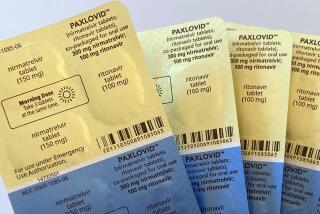New drug combination may shorten, simplify TB therapy
A combination of an experimental drug, an unapproved antibiotic used for treating other infections and an established tuberculosis drug may provide a simpler, more rapid treatment for TB, according to results from a small pilot trial. The combined treatment eliminated 99% of the TB bacteria from the patients’ bodies within two weeks in the study, which suggests that it may be possible to dramatically shorten treatment regimens. And because the regimen does not use any drugs that the TB bacterium has become resistant to or that interfere with HIV treatment, they could potentially be used to treat TB patients who are HIV-positive and those who have drug-resistant TB -- both of which are growing problems.
TB is a relatively minor problem in the United States, with just over 11,000 cases per year. In the rest of the world, however, it is a different story. Roughly 9 million people contract TB each year and an estimated 1.4 million die from it. It is thought that one-third of all people on the Earth have latent TB, in which the bacteria are living in the body but not producing disease. About 30% of HIV-positive people in the developing world contract TB and it is one of the leading causes of death in such individuals. Rifampin, one of the key drugs used to treat TB, interferes with the activity of the commonly used anti-HIV drug efavirenz, making treatment of both diseases more difficult.
The tuberculosis bacterium, Mycobacterium tuberculosis, is difficult to eradicate, and treatment typically requires four to six months, involving a combination of pills, injections and powders. Researchers are concerned because the bacterium is growing increasingly resistant to the most common drugs. Multi-drug resistant TB strains are resistant to the two most commonly used drugs, rifampin and isoniazid. Treatment of such strains requires a variety of other drugs, such as kanamycin, capreomycin and amikacin, and can require as long as two years, but it is frequently unsuccessful. Extensively drug-resistant TB is resistant even to these drugs.
In a phase II clinical trial, a team headed by Dr. Andreas Diacon of Stellenbosch University in Cape Town, South Africa, tested several drug regimens on TB patients who had never received drugs. One regimen, called PaMZ, included an experimental drug candidate called PA-824, originally developed by Chiron, then licensed by Novartis; moxifloxacin, an antibiotic developed by Bayer Healthcare AG that has been approved for treating certain infections, but not TB; and the existing TB drug pyrazineamide. The team reported in the journal Lancet and at this week’s International AIDS Conference in Washington that the combination eradicated 99% of the TB bacterium in two weeks of treatment.
The team is now conducting a longer-term trial to confirm its findings, but Diacon said that a full treatment regimen should be accomplished in as little as four months and that patients should be able to consume fewer medications than is possible with current regimens. Moreover, it should make no difference whether the patient is HIV-positive or has a drug-resistant strain of the bacterium. Such speculations remain to be proved, but “The results of this study give healthcare providers on the frontlines of the TB epidemic hopes for better, faster tools needed to stop the disease,” Diacon said.
The trial was funded by the TB Alliance, the Bill & Melinda Gates Foundation, the U.S. Agency for International Development, U.K. Aid and Irish Aid.
LATimesScience@gmail.com
Twitter/@LATMaugh






